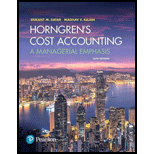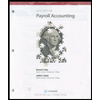
Allocation of common costs. Gordon Grimes, a self-employed consultant near Atlanta, received an invitation to visit a prospective client in Seattle. A few days later, he received an invitation to make a presentation to a prospective client in Denver. He decided to combine his visits, traveling from Atlanta to Seattle, Seattle to Denver, and Denver to Atlanta.
Grimes received offers for his consulting services from both companies. Upon his return, he decided to accept the engagement in Denver. He is puzzled over how to allocate his travel costs between the two clients. He has collected the following data for regular round-trip fares with no stopovers:
| Atlanta to Seattle | $600 |
| Atlanta to Denver | $400 |
Grimes paid $900 for his three-leg flight (Atlanta–Seattle, Seattle–Denver, Denver–Atlanta). In addition, he paid $45 each way ($90 total) for limousines from his home to Atlanta Airport and back when he returned.
- 1. How should Grimes allocate the $900 airfare between the clients in Seattle and Denver using (a) the stand-alone cost-allocation method, (b) the incremental cost-allocation method, and (c) the Shapley value method?
Required
- 2. Which method would you recommend Grimes use and why?
- 3. How should Grimes allocate the $90 limousine charges between the clients in Seattle and Denver?
Want to see the full answer?
Check out a sample textbook solution
Chapter 15 Solutions
Horngren's Cost Accounting: A Managerial Emphasis (16th Edition)
- ABC general accountingarrow_forwardCarter Company disposed of an asset at the end of the eighth year of its estimated life for $16,000 cash. The asset's life was originally estimated to be 10 years. The original cost was $85,000 with an estimated residual value of $8,500. The asset was being depreciated using the straight-line method. What was the gain or loss on the disposal? Questionarrow_forwardNeed help with this question solution general accountingarrow_forward
- Cash and cash equivalents:3200, Accounts receivable:210arrow_forwardQuick answer of this accounting questionsarrow_forwardToones Industries is planning to sell 1,050 boxes of porcelain tiles, with production estimated at 1,020 boxes during June. Each box of tile requires 38 pounds of clay compound and 0.3 hours of direct labor. Clay compound costs $0.45 per pound, and employees of the company are paid $13.50 per hour. Manufacturing overhead is applied at a rate of 105% of direct labor costs. Toones has 4,200 pounds of clay compound in beginning inventory and wants to have 4,900 pounds in ending inventory. What is the total amount to be budgeted in pounds for direct materials to be purchased for the month?helparrow_forward
- Carter Company disposed of an asset at the end of the eighth year of its estimated life for $16,000 cash. The asset's life was originally estimated to be 10 years. The original cost was $85,000 with an estimated residual value of $8,500. The asset was being depreciated using the straight-line method. What was the gain or loss on the disposal?arrow_forwardSubject: general accountingarrow_forwardNone general accountingarrow_forward
